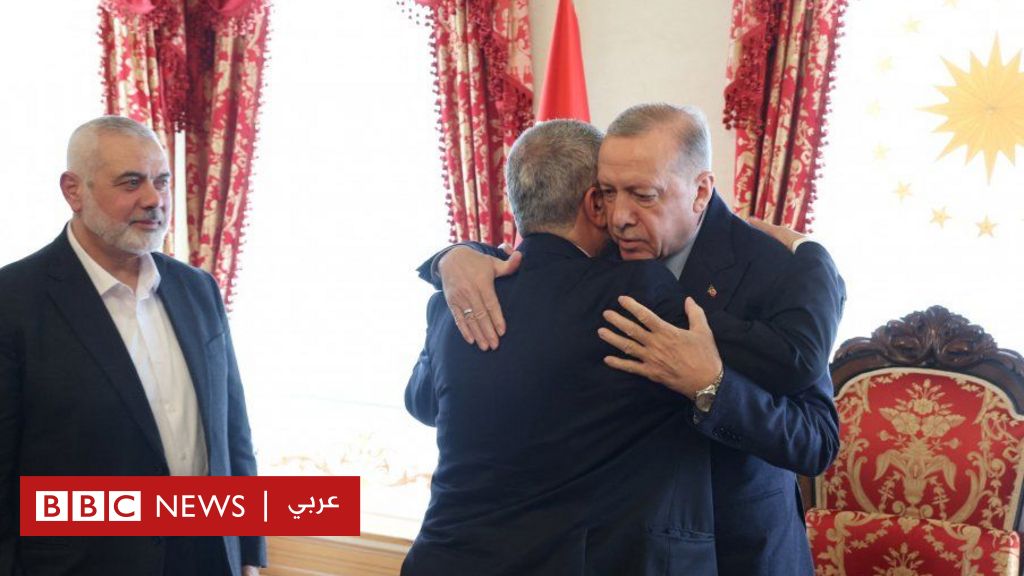Turkish Diplomacy and the Quest for Ceasefire in Gaza: Erdogan's Meetings with Hamas Leader Ismail Haniyeh
Amid regional tensions and shifting diplomatic roles, Ismail Haniyeh's meetings in Turkey could mark a pivotal moment in the quest for a ceasefire in Gaza.
Published April 21, 2024 - 00:04am

Image recovered from alrakoba.net
The visit of Ismail Haniyeh, Head of Hamas's Political Bureau, to Turkey marks a significant juncture in Middle Eastern diplomacy, bringing forth questions about a potential shift from Doha to Istanbul in mediating the Israeli-Palestinian conflict. Haniyeh's engagement with Turkish President Recep Tayyip Erdogan came at a sensitive time, following Qatar's announcement, through Prime Minister and Foreign Minister Mohammed bin Abdulrahman Al Thani, of reevaluating its mediator role in Gaza ceasefire talks.
Qatar, having played a crucial role alongside Egypt and the United States in attempts to broker peace, faced exploitation and underestimation according to its Prime Minister. This revelation coincides with Haniyeh's visit, prompting speculation on Turkey filling the diplomatic void. However, Israel's trust in Turkey as an intermediary remains questionable, given Turkey's historical embrace of Hamas and recent sanctions imposed on Israel by Erdogan following their meetings.
Discussions in Istanbul focused on unity within the Palestinian factions as a formidable response to Israel and the imperative to swiftly enact a ceasefire in Gaza, elevate humanitarian aid, and advance towards a lasting two-state resolution. Turkish Foreign Minister Hakan Fidan expressed during his visit to Doha that Hamas's political leaders had agreed to a State of Palestine within the 1967 borders, implicitly recognizing the existence of Israel and abandoning armed struggle post-statehood.
The Israeli response to Turkey's engagement with Hamas has been one of censure, with Israeli Foreign Minister Israel Katz reproving Erdogan in a sharply-worded address. Amid these developments, Egyptian Foreign Minister Sameh Shoukry, in Istanbul, called for international pressure on Israel to open its borders with Gaza for humanitarian aid and emphasized the urgent need for Palestinian statehood to stabilize the region.
Erdogan's bid for a peacebroker role contends with Israel's rejection for Turkey and Russia as guarantors of any ceasefire agreement—a stance brought to light by Haniyeh's recent revelations. Turkey's trade restrictions on Israel reflect its condemnation of the Israeli actions in Palestinian territories, positioning itself as a defender of justice in the Middle East. Yet, the ultimate efficacy of Turkey's diplomatic maneuvers remains to be seen amidst Gaza's escalating tensions and an international outcry for a decisive resolution.
The strategic implications of Haniyeh's visit to Turkey have rippled through international corridors, illuminating Turkey's growing aspirations to reposition itself as a central mediator in Middle Eastern affairs. The relationship between Turkey and the Palestinian factions, primarily Hamas, is deeply rooted in a mutual ideological sympathy and a shared perspective on Palestinian national aspirations. Turkey's Islamist political identity under the Justice and Development Party (AKP) aligns closely with Hamas's objectives, which may facilitate negotiations in ways that other mediators could not.
Despite Turkey's eagerness to assume a more significant diplomatic role, its history of fluctuating relations with Israel could complicate its position. Erdogan's ideological rhetoric against Israel's policies has often been matched by pragmatic trade relations, showcasing an intricate balance that Ankara needs to maintain to achieve its foreign policy goals. This duality raises questions about Turkey's potential to effectively bridge the gaps between Hamas and Israel to de-escalate the ongoing conflict.
Observers also note the domestic considerations that might drive Erdogan's engagement with the Hamas leadership. As Turkey heads toward critical elections, Erdogan's stance on Palestine serves to bolster his Islamic and nationalist credentials among voters. The potential diplomatic triumph in resolving the conflict could also provide a much-needed boost to Erdogan's administration, which faces economic challenges and a diverse political opposition at home.
Meanwhile, the international community views the reassignment of mediatory responsibilities with cautious optimism. While support for a Palestinian state remains strong across much of the global South, allies are keenly aware of the intricate balance of power and the delicacy required in negotiations. The European Union has restated its commitment to a peaceful negotiation process that leads to two states living side by side in harmony. Similarly, the United Nations continues to emphasize dialogue and cooperation as cornerstone principles for any enduring diplomatic solution.
The prospect of a ceasefire and the delivery of humanitarian aid to Gaza are immediate concerns that face immense logistical and political hurdles. International agencies and NGOs are poised to deliver support once an accord is reached, but the political will on all sides remains a primary obstacle. The situation in Gaza is desperate, with long-standing issues such as water scarcity, electricity shortages, and a lack of medical resources being exacerbated by the ongoing tensions.
Furthermore, the role of other regional players, such as Egypt and Qatar, in future negotiations cannot be overlooked. Egypt, with its geographic proximity and historical ties to both Israel and Palestine, retains considerable influence, while Qatar's sizable diplomatic and financial investments in Gaza position it as a critical actor in the unfolding narrative. The multiplicity of stakeholders underscores the complexity of achieving a comprehensive and durable agreement.
In conclusion, as the region awaits the outcomes of Turkey's burgeoning diplomatic endeavor fronted by President Erdogan, the international community remains engaged yet apprehensive. It is an unfolding situation that demands careful attention, nuanced diplomacy, and a collaborative approach to ensure peace and security in the Middle East. The world watches on to see whether Turkey's efforts will herald a new era in Israeli-Palestinian relations or if it will be a chapter of missed opportunities and unmet expectations amidst the ever-volatile landscape of Middle Eastern geopolitics.






